New Year, New Opportunities in Ediscovery Job Market
Contents
January’s Eye on ESI webinar did not disappoint the record number of attendees wanting to know the latest industry job market trends, news, and practical tips for gaining new roles or attracting and retaining the top talent in the ediscovery industry. Hosts Jared Coseglia, Founder and CEO of TRU Staffing Partners, Maribel Rivera, ACEDS’ VP of Strategy and Client Engagement, and Michael Quartararo, president of ACEDS, provided a fast-paced review of the latest statistics the market has shown and offered their tips to job seekers and hiring managers in this burgeoning market.
An Overview of the Hottest Market Trends
.png?width=720&height=405&name=Eye%20on%20ESI%20January%202024%20(1).png)
Coseglia: Where we left off in December, we found that contract staffing increased very aggressively. At the end of 2023, the contract job market overtook direct hiring at a three-to-one ratio at the point of hire. That’s a very dramatic statistic! We are seeing that same activity play out at the beginning of this year: Contract staffers are needed for holiday coverage, to fill slow beginning-of-the-year hiring gaps, and they can move into roles and be effective very quickly.
The second trend is the speed of hire is slowly increasing for ESI project managers and analysts by at least 10 days from start to end of the hiring process. This means that hiring managers are making decisions faster on mid-market hires at both law firms and vendors. It is unusual to see law firms move at the same pace as vendors, but they need to because candidates are receiving multiple offers as well as counteroffers.
And that’s another piece of news: Counteroffers were nonexistent early in 2023. If you attended our last Eye on ESI, you may remember me touting that TRU had not had anyone receive a counteroffer, much less accept one, in 170 days. That was a record-breaking length of time for us where no one represented by TRU got a counteroffer when they resigned. That all changed in the month of December when 10% of TRU’s ESI job seekers received counteroffers with 7.5% of them accepting those offers. This is a remarkably high percentage of people. Anyone who has worked with me knows my feelings about counteroffers: You should never accept one. The Bureau of Labor statistics tell us on a national level, year-over-year, that between 90% and 96% of the people accepting counteroffers either leave or get fired within six months of that transaction. So, counteroffers rarely work out — they are Band-Aids for both the employees and the employer. Some of this surprising trend is due to employers realizing how difficult it is to get enough budget to replace people who are leaving as well as the process for replacing staff.
I can tell you that employers will be cautious for the first two quarters of this year around full-time hiring. However, there will be a lot of volume and opportunities in various areas. However, we predict that in the third and fourth quarters, there will be a frenetic amount of hiring as the industry continues to scale and grow.
Rivera: Are you tracking how many of those people who accept counteroffers come back to you in six months or a year to look for another position?
Coseglia: It’s nearly everyone. And they usually come looking in the three-to-four-month window, or they never stop looking. They simply recalibrate their expectations based on their new salaries or promotions as a result of the counteroffer. These people will be able to command more of a salary bump in the market with their higher salaries. Or they have accepted a counteroffer because they are currently remote, and their new outside offer would require time in the office.
Quartararo: I agree with your stance on counteroffers but in my experience, a hiring manager is willing to go to bat for someone if they say they are going to leave. They make the case for that person to get a salary bump, or whatever they would be getting in their new roles because they are valuable to the employer’s organization. That means something and the person who was leaving appreciates that and might stick around longer.
Coseglia: There are anecdotes in every direction. What I would offer as a bit of guidance to job seekers is that it is far better to have the courage to ask for a salary and raise, and be told yes or no, than to go behind the employer’s back and come back with another offer to force the employer’s hand. It leaves a bad taste in an employer’s mouth, whether they went to bat for you or not. But what we would like to cultivate in our ediscovery community is people having the courage to ask for the things they want because then they can make more of a decisive decision to leave if the ask is denied them. Don’t use the interview process as a means to get a counteroffer. We always ask our job seekers: What do you want? And if we determine that they are just looking for more money or a promotion, we coach them on how to get it with their current employer. Knowing what you want out of the job market is critical because you don’t want to burn bridges.
Rivera: The answer is always no if you don’t ask. To your point Jared, if a job seeker doesn’t know how to ask for something, they need to seek out help from someone who does. And, if you can’t have a hard conversation with someone, do you really want to work with them?
Coseglia: Hard conversations bring us closer together or further apart. Honesty is a two-way street, and you may have to take professional criticism to gain maturity in your career. Let’s move back to the last two points on the Trends slide. The fourth point, offer acceptance on first offer dropped slight to 65% late last year. This is because job seekers are getting multiple offers, unlike how things were earlier in 2023 when most people accepted first offers quickly. As a point of contrast in 2022, there were so many offers that this stat was about 40-45%. This percentage is dropping because of several factors, which is our final point on the Trends slide: Speed of hire is increasing, the job volume is increasing, the cost of talent is decreasing, and skill experience expectations are decreasing, hiring managers want less expensive, less experienced people because they need to increase their margins because they cannot raise their prices. Therefore, there will be a lot of job opportunities for people in the under $150k base salary level. The volume is very high right now.
Contract Versus Full-Time Roles in 2024
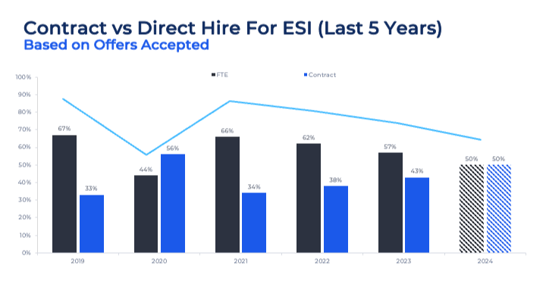
Coseglia: Essentially, this slide shows what TRU has seen over the last five years in the contract versus direct hire market. The industry is slowly starting to recalibrate after a strong preference for direct hires. We anticipate a 50/50 market split becoming the new normal. In ediscovery most of the workers are billable resources, so you will see more full-time hiring here than you will in cybersecurity or data privacy markets. We are seeing much more contract hiring in the first half of this year, and we will see much more full-time hiring in the second half of the year. This is the sign of a healthy ecosystem. There is something for almost everyone.
Remote/Hybrid vs. In-Office Roles in 2024
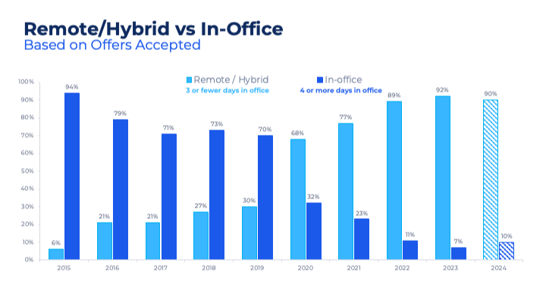
Coseglia: This is another analysis we break down in our jobs report. You can plainly see the moment in time when our lives as working professionals changed. Everyone went from full time in an office to hybrid situations or remote. TRU believes that the new normal is going to be three days or fewer a week in the office. Any employers mandating more will struggle to fill open roles.
Quartararo: Fascinating! Is the sense that now the employer controls the remote-work situation? During COVID, it was easy to make the case for remote work. But is that getting harder now?
Coseglia: What we saw during 2023, was employers giving up on a five-day in-office presence and moving to two or three days. There is a stat that if employers go from three days to two days in-office, they increase their ideal candidate pool by 50%.
Salary Averages by Employer Type, Experience Levels
Overall, law firm and vendor salaries have not changed since last year and are expected to be what’s presented here in the slides below.
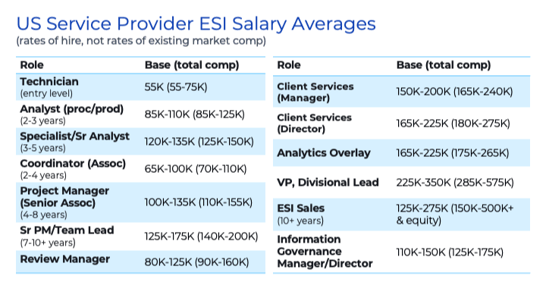
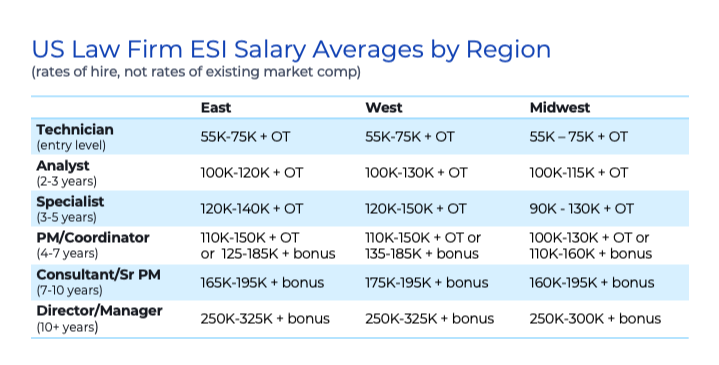 Coseglia: Many job seekers are curious about what salaries they can command in the marketplace and the percentages they could ask for at the point of hire. These numbers have changed significantly over a two-year period. In 2022, mid-market ESI folks (4 to 10 years) could command a much higher bump when changing jobs as you can see from slide below. These folks were in the highest demand and were in the lowest supply.
Coseglia: Many job seekers are curious about what salaries they can command in the marketplace and the percentages they could ask for at the point of hire. These numbers have changed significantly over a two-year period. In 2022, mid-market ESI folks (4 to 10 years) could command a much higher bump when changing jobs as you can see from slide below. These folks were in the highest demand and were in the lowest supply.
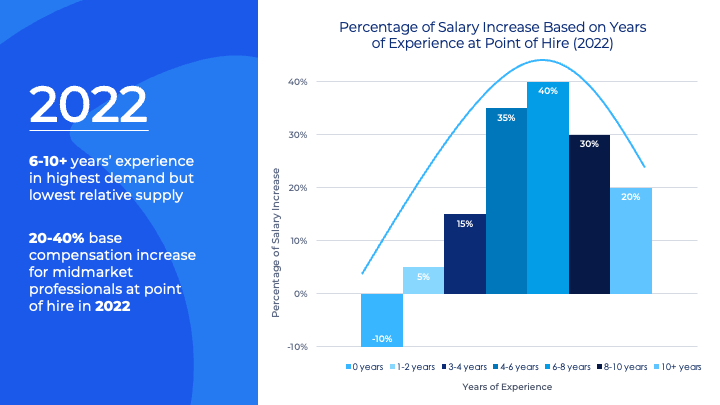
In 2023, the story was much different. Entry-level ediscovery professionals were most needed but are in the lowest relative supply. Mid-market folks did not receive the same level of increase in pay – salary bumps were lower and there were far fewer people in the marketplace looking for new roles. The way the market behaves changes, and this may not be the case for long. If you are looking for a new role and are a new professional, contact us now.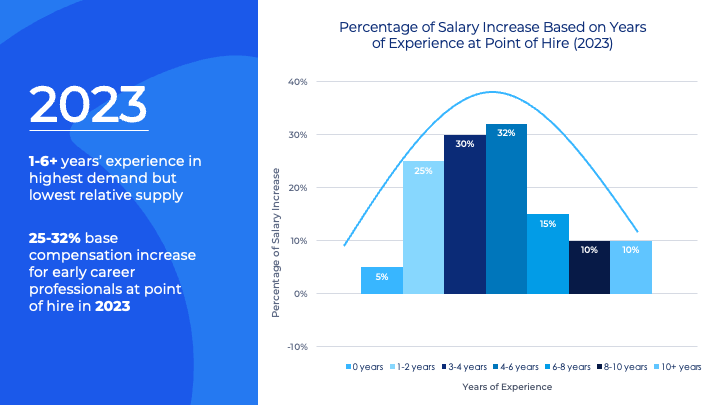
Opportunities Are Available
There are many open roles perfect for entry-level ESI pros, all types of contract workers, and those willing to work a few days a week in an office. However, it is crucial to take the right step at the right time. That’s why both job seekers and hiring managers need a good talent agent. Your TRU talent agent knows which levers to pull to get the right person for the right role. TRU Staffing Partners will help you find the best possible option for your career or hiring needs. Contact us for representation or to start your hiring process today.
Did you miss the live broadcast of this webinar? Watch the full recording, here.
Just want the monthly compensation metrics? Download the monthly proprietary compensation metrics deck, here.
%20(1).png?width=150&height=51&name=LinkedIn%20Company%20Profile%20Image%20(Email%20Header)%20(1).png)

